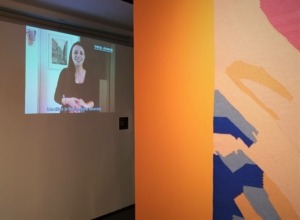Foto: Neboje Tejić/STA
On Wednesday, 2 February 2022, MEP Irena Joveva hosted the President of the LMŠ party, Marjan Šarec, in a “live” conversation on her Instagram profile @ijoveva. In a relaxed atmosphere, they gave their unfiltered and uncensored replies to the questions posed by followers.
They started by answering a question about the things they miss most from their life before politics. “There are many things… I was more relaxed, I could do things more freely, and I miss all the people I worked with before I entered politics,” said Marjan Šarec, and Irena Joveva could only agree with him about the people she misses. She added that from a professional point of view, she also misses fieldwork as a journalist, when she could research, do interviews and write contributions. They recalled Irena’s entry into politics and Šarec was frank: “It’s no secret, I was the instigator. I called her and asked whether she would be the lead candidate for the European elections. When she answered, I knew that this was it, that this was the right decision. I will certainly never regret it.” They also noted that the experience of the past often comes in handy. For Joveva, her knowledge of broader political topics and the necessary rhetoric skills: “In the European Parliament, we have about one minute to speak or debate. I have experience of live reporting that was of the same length, so I find it much easier than my colleagues to summarise what I mean in that one minute.’
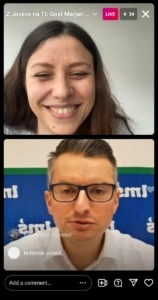 Since they have been in politics, the main source of satisfaction for both of them has been people’s response to their work. Joveva is keeping her campaign promise that she is there for the people who sent her to Brussels: “When you know that you have helped someone, answered their question or helped in a more concrete way, submitted a question for the Commission, asked a fellow politician a question, raised a topic in a meeting, submitted an amendment and thus actually changed the legislation.” Šarec added: “Irena and I both come from a working-class or farming background, our lives have not always been a walk in the park and we know that effort has to be put in to achieve results. Nothing has been given to us for free. This is also how we approach our work in politics. I don’t like snobbery and pretentiousness, I have always been happiest when I have been able to have direct contact with people.” Politics, he says, reveals who you really are.
Since they have been in politics, the main source of satisfaction for both of them has been people’s response to their work. Joveva is keeping her campaign promise that she is there for the people who sent her to Brussels: “When you know that you have helped someone, answered their question or helped in a more concrete way, submitted a question for the Commission, asked a fellow politician a question, raised a topic in a meeting, submitted an amendment and thus actually changed the legislation.” Šarec added: “Irena and I both come from a working-class or farming background, our lives have not always been a walk in the park and we know that effort has to be put in to achieve results. Nothing has been given to us for free. This is also how we approach our work in politics. I don’t like snobbery and pretentiousness, I have always been happiest when I have been able to have direct contact with people.” Politics, he says, reveals who you really are.
The next part of the conversation was devoted to answering the questions submitted by followers. Instagram is a “social network for the young”, but the audience was nevertheless interested in substantive and very specific areas. The first question was about the current and possible new electoral system, which has always been one of the most important issues for the LMŠ party. A bill was previously drafted during the government led by Šarec which introduced a majority system, preferential voting and the abolition of electoral districts, but unfortunately, due to the purely personal interests of some deputies, it was not adopted. “As long as the electoral system isn’t changed and it continues to be complicated, distant from the people and prevents them from playing a decisive role in the selection of deputies, there will be no political change in Slovenia. The electoral system we are advocating could also address the issue of recalling a deputy, which is currently impossible,” Šarec explained.
Housing, especially for young people, is another issue that can no longer be swept under the carpet. Marjan Šarec described the LMŠ efforts in this direction so far:
“Under our government, we prepared a housing loan guarantee act. We also wanted to transfer to the bad bank the land on which the bank Asset Management Company would build apartments. Our party programme also contains a proposal about the creation of housing cooperatives based on foreign models, as this has proven a good solution. It contains the regulation of short-term rentals, the possibility of buying the first owner-occupied home with repayment through rent, and the strengthening of the public housing stock. But we also need to enable young people to enter the labour market as quickly as possible, as this is the only way to get a loan.”
Šarec and Joveva also touched upon the “Magyarisation of Slovenia”. They both see a solution in taking part in the elections of 24 April 2022. It is important to remember that there are no perfect candidates. “Somebody has to be given a vote and then be held accountable,” said Šarec. He believes that the current Prime Minister has become a servant of Budapest and Slovenia a vassal state. During this term, the LMŠ has set up two inquiry commissions to investigate illegal appointments within the police and suspicious procurement of protective equipment, respectively. If necessary, it will set up a new one in the next term to investigate hotel sales:
“All these transactions will need to be audited and all harmful laws repealed. As LMŠ, we are uncompromising when it comes to corruption and investigation. We will certainly demand audits, and we can do this as we owe nobody any favours.”
Joveva and Šarec are also aware of the problems in public health care. According to Marjan Šarec, pay increases in only one salary group will cause major problems and chaos. He believes that the remuneration system needs to be regulated anew in a systemic and complete manner: “The first task the next government will need to tackle will be to negotiate with trade unions, as was the case in 2018.” The shortage of family doctors is a problem that can only be solved in the long term. In addition to corruption, Šarec also sees a problem in the organisation of work and “amphibian practice” which allows some doctors not to contribute as much as they could to the public system, and instead work in their private self-pay outpatient clinics in the afternoon. In addition, supplementary health insurance should be abolished, as it has long since become compulsory if one wishes to benefit from the full basket of healthcare services.
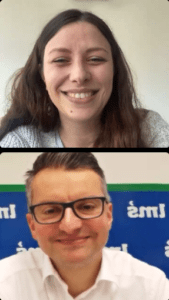 Meanwhile, the COVID-19 epidemic has not only exposed problems in the health care sector, but also the confusion thrown up by the measures dictated by the government. Šarec and Joveva agreed that, during the pandemic, the authorities’ communication with citizens was the primary problem. Šarec advocates softer measures in dealing with the epidemic, such as distancing, masks, hand and cough hygiene, self-testing of everyone, including those who have been vaccinated, and strict adherence to quarantine. However, he does not support compulsory vaccination. He added that, as a result, the LMŠ would not be able to work with parties that oppose all COVID measures, even if some people should find this a good idea.
Meanwhile, the COVID-19 epidemic has not only exposed problems in the health care sector, but also the confusion thrown up by the measures dictated by the government. Šarec and Joveva agreed that, during the pandemic, the authorities’ communication with citizens was the primary problem. Šarec advocates softer measures in dealing with the epidemic, such as distancing, masks, hand and cough hygiene, self-testing of everyone, including those who have been vaccinated, and strict adherence to quarantine. However, he does not support compulsory vaccination. He added that, as a result, the LMŠ would not be able to work with parties that oppose all COVID measures, even if some people should find this a good idea.
Šarec and Joveva also touched on the need for a transition to a knowledge-based society, for development and digitalisation of society. “In the LMŠ programme, we have devoted many measures to digitalisation and even foreseen a new Ministry of Science, Research and Digital Transformation.” They commended some systems already in place and highlighted the numerous areas where there is an urgent need for the system to be revamped and upgraded, especially as regards services to citizens. “We still have children who do not have access to the internet, and as long as this is the case, it is difficult to talk about a digital society,” Šarec maintained, adding that the LMŠ programme foresees an increase in funding for science, research and development, with the aim of allocating to these areas up to 1.5% of GDP by 2026.
Finally, Šarec and Joveva urged people to read the LMŠ programme, which is available on the party’s website. As questions continued to come in, they decided to hold another conversation in the near future. In the meantime, you are welcome to watch the recording on Irena Joveva’s Instagram profile.

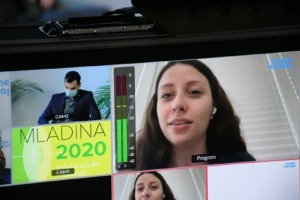 Similarly, Irena Joveva focuses most of her work on young people, who, she says, are equal, fully-fledged and indispensable members of a developed and modern society and deserve to be treated as such. “There are more and more young people who regularly experience loneliness and stress. Experts point in particular to stress-related disorders such as anxiety and depression, but also to eating disorders, anxiety disorders and behavioural and emotional disorders. The pandemic and the measures taken as a result of it merely compound all of them,” she said, also mentioning the impact and pressure from parents and social networks. As a shadow rapporteur on behalf of Renew Europe, Joveva will contribute to the report on the impact of COVID-19 closures of educational, cultural, youth and sports activities on children and young people in the EU, and make sure it includes the need to provide timely help to young people in mental distress and to improve society’s awareness of mental health issues.
Similarly, Irena Joveva focuses most of her work on young people, who, she says, are equal, fully-fledged and indispensable members of a developed and modern society and deserve to be treated as such. “There are more and more young people who regularly experience loneliness and stress. Experts point in particular to stress-related disorders such as anxiety and depression, but also to eating disorders, anxiety disorders and behavioural and emotional disorders. The pandemic and the measures taken as a result of it merely compound all of them,” she said, also mentioning the impact and pressure from parents and social networks. As a shadow rapporteur on behalf of Renew Europe, Joveva will contribute to the report on the impact of COVID-19 closures of educational, cultural, youth and sports activities on children and young people in the EU, and make sure it includes the need to provide timely help to young people in mental distress and to improve society’s awareness of mental health issues.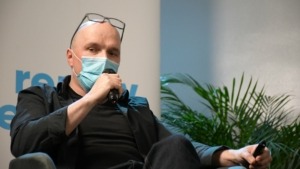 Andrej Naterer presented the results of the Youth 2020 survey, which revealed worrying trends: “Stress among young people has more than doubled, young people say they feel it most days. The proportion of young people who are lonely has tripled. COVID has contributed to loneliness, but not significantly, as loneliness was already increasing before COVID and will persist and increase once the pandemic is over. And there is also a growing presence of anxiety among young people.”
Andrej Naterer presented the results of the Youth 2020 survey, which revealed worrying trends: “Stress among young people has more than doubled, young people say they feel it most days. The proportion of young people who are lonely has tripled. COVID has contributed to loneliness, but not significantly, as loneliness was already increasing before COVID and will persist and increase once the pandemic is over. And there is also a growing presence of anxiety among young people.”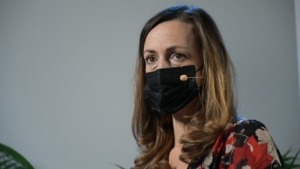 Andreja Poljanec also touched on the aspect of environment and peers, as being close to family and friends goes a long way towards adolescents not developing mental disorders. She would like to see changes in the curricula at all levels of education and that those who work professionally with young people would be equipped with the modern knowledge and skills needed for working with young people. Andrej Naterer also mentioned research showing that our sensitivity to stress has increased, while at the same time societal pressures are mounting. Activities that worked against stress in the past now add to it: “They, too, have a competitive element nowadays. If you do sport, there’s always someone better, if you do yoga, there’s always someone doing more asanas.” The findings show that good family relationships are the first line of defence, followed by good relationships within the extended family, in the neighbourhood and with friends. It is the spread of egoistic behaviours that we have been witnessing in recent years that is tearing us apart and increasing stress. The solution lies in improving relationships and in consciously withdrawing from stress-inducing impulses, including constant online presence. Klemen Selaković confirmed that depression is a disease of difficult personal relationships, but also stressed the importance of one’s own engagement: “One has to ask oneself if it really is the parents, mother, capitalism who are to blame for everything? If you believe that, then you are not taking responsibility for your own life.”
Andreja Poljanec also touched on the aspect of environment and peers, as being close to family and friends goes a long way towards adolescents not developing mental disorders. She would like to see changes in the curricula at all levels of education and that those who work professionally with young people would be equipped with the modern knowledge and skills needed for working with young people. Andrej Naterer also mentioned research showing that our sensitivity to stress has increased, while at the same time societal pressures are mounting. Activities that worked against stress in the past now add to it: “They, too, have a competitive element nowadays. If you do sport, there’s always someone better, if you do yoga, there’s always someone doing more asanas.” The findings show that good family relationships are the first line of defence, followed by good relationships within the extended family, in the neighbourhood and with friends. It is the spread of egoistic behaviours that we have been witnessing in recent years that is tearing us apart and increasing stress. The solution lies in improving relationships and in consciously withdrawing from stress-inducing impulses, including constant online presence. Klemen Selaković confirmed that depression is a disease of difficult personal relationships, but also stressed the importance of one’s own engagement: “One has to ask oneself if it really is the parents, mother, capitalism who are to blame for everything? If you believe that, then you are not taking responsibility for your own life.” Since they have been in politics, the main source of satisfaction for both of them has been people’s response to their work. Joveva is keeping her campaign promise that she is there for the people who sent her to Brussels: “When you know that you have helped someone, answered their question or helped in a more concrete way, submitted a question for the Commission, asked a fellow politician a question, raised a topic in a meeting, submitted an amendment and thus actually changed the legislation.” Šarec added: “Irena and I both come from a working-class or farming background, our lives have not always been a walk in the park and we know that effort has to be put in to achieve results. Nothing has been given to us for free. This is also how we approach our work in politics. I don’t like snobbery and pretentiousness, I have always been happiest when I have been able to have direct contact with people.” Politics, he says, reveals who you really are.
Since they have been in politics, the main source of satisfaction for both of them has been people’s response to their work. Joveva is keeping her campaign promise that she is there for the people who sent her to Brussels: “When you know that you have helped someone, answered their question or helped in a more concrete way, submitted a question for the Commission, asked a fellow politician a question, raised a topic in a meeting, submitted an amendment and thus actually changed the legislation.” Šarec added: “Irena and I both come from a working-class or farming background, our lives have not always been a walk in the park and we know that effort has to be put in to achieve results. Nothing has been given to us for free. This is also how we approach our work in politics. I don’t like snobbery and pretentiousness, I have always been happiest when I have been able to have direct contact with people.” Politics, he says, reveals who you really are. Meanwhile, the COVID-19 epidemic has not only exposed problems in the health care sector, but also the confusion thrown up by the measures dictated by the government. Šarec and Joveva agreed that, during the pandemic, the authorities’ communication with citizens was the primary problem. Šarec advocates softer measures in dealing with the epidemic, such as distancing, masks, hand and cough hygiene, self-testing of everyone, including those who have been vaccinated, and strict adherence to quarantine. However, he does not support compulsory vaccination. He added that, as a result, the LMŠ would not be able to work with parties that oppose all COVID measures, even if some people should find this a good idea.
Meanwhile, the COVID-19 epidemic has not only exposed problems in the health care sector, but also the confusion thrown up by the measures dictated by the government. Šarec and Joveva agreed that, during the pandemic, the authorities’ communication with citizens was the primary problem. Šarec advocates softer measures in dealing with the epidemic, such as distancing, masks, hand and cough hygiene, self-testing of everyone, including those who have been vaccinated, and strict adherence to quarantine. However, he does not support compulsory vaccination. He added that, as a result, the LMŠ would not be able to work with parties that oppose all COVID measures, even if some people should find this a good idea.
